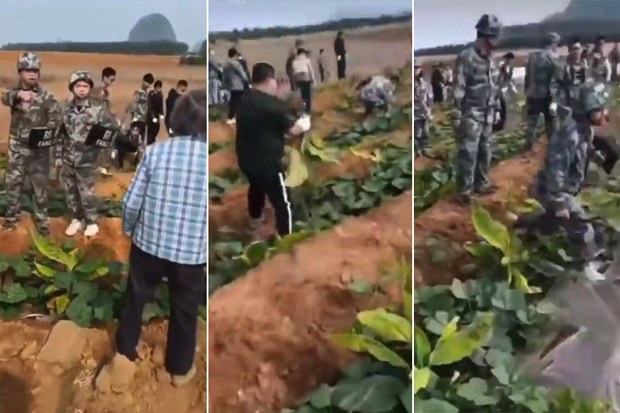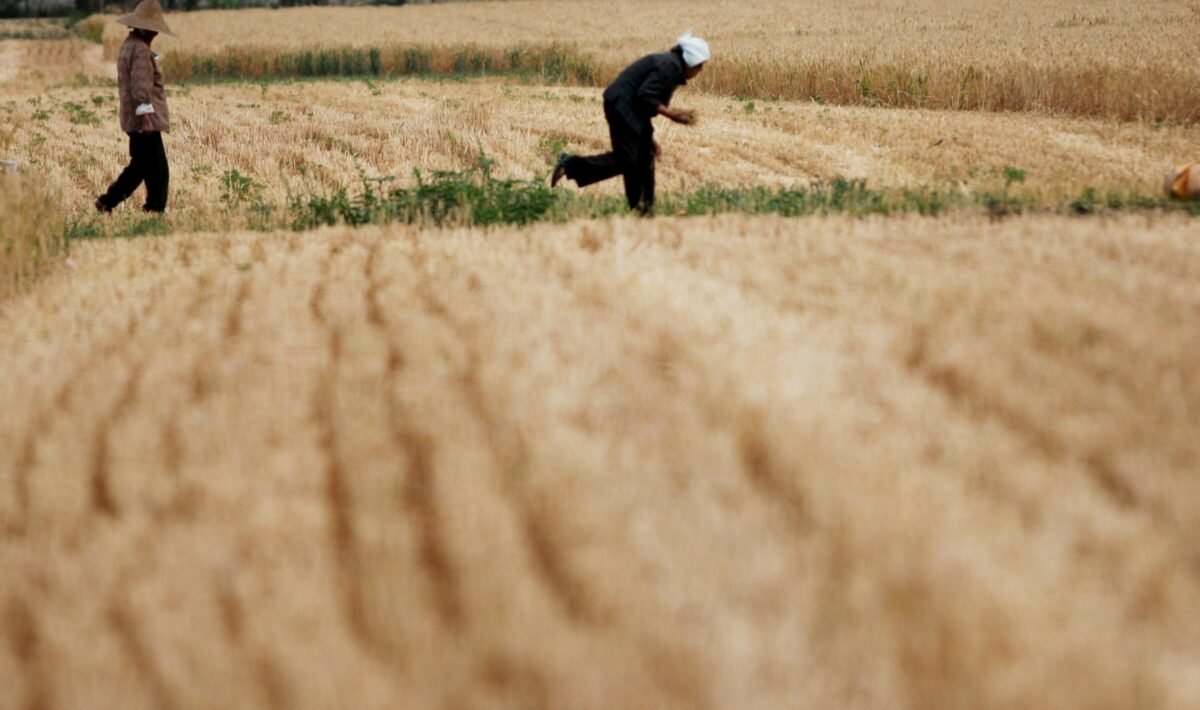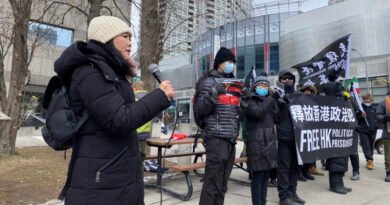China’s Heavy Handed ‘Rural Management’ Campaign Sparks Widespread Discontent
Communist policy to increase grain production heaps additional burden on already struggling rural communities
Tens of thousands of “law enforcement” personnel dispatched by Beijing have descended upon China’s vast countryside to enforce compliance with the Chinese regime’s latest demands for expanded grain production.
Over 2,500 grassroots “agricultural law enforcement teams” have implemented the central authorities’ new directives on planting, animal husbandry, water usage, and product quality and safety.
The result has been chaos and misery across numerous communities as the rural management personnel, or “nongguan” as they are nicknamed in Mandarin, wantonly inflict severe consequences on hapless residents and their property for minor or even nonexistent infractions.
Videos and accounts posted on social media show the nongguan digging up healthy vegetable sprouts, bulldozing gardens, sawing down fruit trees, or hounding livestock they claim are in violation of the central policies.
One video posted early April from the outskirts of Yuncheng, a city in northern China, shows a road roller with an affixed banner saying “strictly ban planting and selling green produce.” The machine can be seen crushing a patch of winter jujubes.

In a video taken in Leping, eastern China, a woman bitterly describes how the nongguan decided to raze her painstakingly planted bamboo grove and revert it to farmland. Others lamented how their fish ponds were mercilessly filled in and their geese beaten with sticks. Some farmers reported being forced to immediately sell off their ducks, chickens, and pigs, no matter the price.
Villagers are also required to pay an additional annual fee of 18 yuan ($2.60) for the officers’ “services,” according to Chinese internet users. Hundreds of millions of Chinese people live on less than 500 yuan (about $80) a month.
Elsewhere, Chinese rural residents have been ordered to cut down forests that had previously been planted on farmland under the Chinese Communist Party (CCP)’s earlier drive to improve the environment, and revert them to grain production.
Even parts of the Green Belt, a 60-mile ecological park in southwestern China’s metropolis of Chengdu, are being dug up for agricultural use. Built at a cost of 34 billion yuan (around $4.9 billion) between 2003 and 2017, the Green Belt is a popular and well-known attraction in the city.
‘Managing the Countryside’
A combination of unprecedented flooding, droughts, and the seizure of fertile land to fuel China’s bloated real estate development has taken a serious toll on the country’s harvests. In addition, with the international climate turning against the regime, Beijing has set its hopes on becoming 90 percent self-sufficient in grains as projections for China’s food security dim.
In February, the State Council, communist China’s cabinet-like body, published its “No. 1 Document,” which called for the “stable production and supply of grain and important agricultural products,” as well as for China’s farmers to meet a quota of 650 million metric tons of grain this year.
Though China is nearly the same size as the United States, it has over 1 billion people compared with 330 million Americans. Moreover, according to Chinese financial news site Economic Daily, the country had just 316 million acres of arable land in 2019, while America boasted 893 million acres—the most of any nation on earth.
Economic Daily further noted that China’s agricultural capacity continues to decrease, and by 2032 it will fall below the “red line” of 1.8 billion mu (roughly 296 million acres).
Cao Yaxue, editor of the human rights website China Change, told The Epoch Times that in its anxiety over grain production, the “authoritarian government in Beijing knows it isn’t enough to simply issue written edicts. It has to implement its demands through force.”
The personnel tasked with carrying out the CCP’s directives on maximizing grain output are part of the Comprehensive Agricultural Law Enforcement Teams (CALET), a program established under the Ministry of Agriculture and Rural Affairs following CCP and state institutional reforms announced in 2018. According to state statistics, there are currently over 80,000 officers assigned to 2,564 enforcement teams.
Chinese netizens quickly nicknamed the rural management enforcement teams nongguan, after the infamous urban administrative and law enforcement officers called “chengguan,” or “urban management.” These officials are known for their coercive and violent behavior, terrorizing roadside business owners and other, often low-income, residents on the streets of China’s cities.
Much like the maligned chengguan, CALET personnel also harangue rural residents over supposed violations of public order and aesthetics, while abusing their power. Some peasants reported being ordered not to plant crops that turn yellow in the autumn near ponds because they “don’t look good;” others were warned against hanging laundry in their yards; and some nongguan reportedly took villagers’ “contraband” poultry for themselves.
The CALET personnel themselves seem to be aware of their reputation. In one video, a man in a black police uniform declares: “What the traffic management can’t control, we control; what the chengguan can’t control, we also control. We nongguan are empowered from the top, we act first, ask questions later.”
Another video shows nongguan officers wielding shovels, apparently instructing farmers on the “correct” way to till their soil.
Tunnel Vision and Regime Control
On April 15, the agricultural ministry published a question-and-answer article between journalists and a “relevant person-in-charge” at the ministry’s department of laws and regulations.
During the Q&A session, the official explained how CALET was established in line with requirements made at the Third Plenum of the CCP’s 19th Central Committee in March 2018. The Party leadership had at the time mandated the creation of five types of “law enforcement teams” to be responsible for agriculture and environmental protection, transportation, culture, and the market.
The official added that the mission of CALET officials is to crack down on fraud and other illegal activity in the countryside, not “interfere with the normal production and livelihoods of peasants.”
However, the CCP’s tunnel vision on maximizing grain output at all costs, coupled with the political culture of sweeping, heavy-handed mass campaigns, does not foster smooth or humane implementation of the agricultural ministry’s stated goals.
According to Wang He, a Chinese political commentator and contributor to the Chinese-language edition of The Epoch Times, the arrogance with which “rural management” officials flaunt their “empowered” status indicates that they indeed operate with higher approval.
Wang noted in an April 27 analysis that in 2021, Chinese leader Xi Jinping gave an explicit instruction saying that “local Party committees and government at all levels must shoulder the political responsibility for food security.”
This year, the instructions for local CCP officials are becoming even stricter. In March, the agricultural ministry issued a mobilization order to the CALET units nationwide, which followed the implementation on Jan. 1 of the ministry’s “comprehensive administrative law enforcement measures for agriculture.”
Yet the basic economic incentives for farmers run up against the policies of the CCP, which sees all farmland as public property that is merely worked, rather than owned, by China’s roughly 400 million peasants.
Farming, and in particular the cultivation of grain, is extremely unprofitable in China, and peasants carry the burden of various convoluted regulations and fee schedules. They are also frequently the victims of outright graft.
“Farmers lack opportunities to generate income,” said Cao, the China Change editor. “This is because the state maintains monopolies on all the major agricultural products.”
She brought up the case of independent agricultural mogul Sun Dawu—who was handed an 18-year prison sentence in 2021—as an example of how the Party’s rural policies, far from “revitalizing the countryside, and modernizing agriculture in a comprehensive manner,” as the agricultural ministry claims, actually crush China’s prospects for a successful farming sector.
Sun was an advocate of rural reforms that would allow farmers to both produce and market their products, something that the system of state monopolies prevents.
But Sun’s multi-billion-yuan success story, built from scratch with his once-impoverished relatives, would never convince the authorities to reconsider their ways, Cao observed in an April 30 piece.
“The one thing the CCP will never allow farmers is full control over their production,” she wrote.




